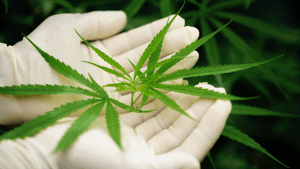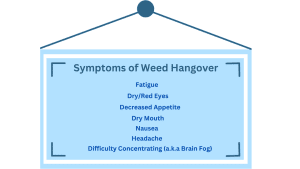So, you had a chill evening with your friends, hung out with Mary Jane, and laughed so hard until your stomach hurt!
But the next morning hits, and you wake up feeling drained, with a dry mouth and a foggy mind, like you’re moving through a slow-motion sci-fi movie. Does that sound familiar, my fellow stoners?
This is what we call a “ weed hangover.” Well, it’s not just a myth; it’s a reality for many of us who enjoy a little green.
No wonder the after-morning can be a bit rough- the dizziness, dry eyes, and that insatiable thirst for water can hit all hard, eventually making you wonder how to sober up from weed.
Well, here’s the silver lining: you don’t have to tough it out! We got you this ultimate blog, covering everything from what causes these symptoms to all the tips and remedies to turn down the high!
Let’s take a sneak peek at how to reclaim your day and feel fantastic all over again!
Let’s Know the Science Behind!

Firstly, we need to understand the science behind what cannabis actually does to our body.
You might already know that a weed high is primarily caused by tetrahydrocannabinol (THC), the active compound in cannabis, right?
- When you consume them, THC enters your bloodstream and travels to the brain. There, it binds to cannabinoid receptors, a part of your brain’s endocannabinoid system (ECS). FYI, ECS is responsible for regulating a variety of physiological functions in your body, including mood, appetite, and even pain sensation.
- Once THC interacts with these receptors, it alters how your brain communicates, leading to the effects of a “high,” which can include feelings of euphoria, relaxation, altered perception of time, and heightened senses.
- However, the way THC interacts with this system varies from person to person, influenced by factors such as your metabolism, body weight, consumption capacity & method, type of strain, and overall health.
The science behind it is fascinating, but it can also lead to a weed hangover if your body has a hard time breaking down and eliminating the THC from your system.
“Now you must have got the idea why some people bounce back so easily while some others might feel like being hit by a bus!”
How Does it Differ from an Alcohol Hangover?

A cannabis hangover, or as some might call it, “the morning-after mellow,” is the residual effect of THC and other cannabinoids remaining in your system.
After cannabis is consumed, particularly in high doses or through edibles, it can take longer for your body to metabolize and eliminate these compounds. This delayed breakdown can lead to residual effects even after the high has worn off.
On the other hand, alcohol hangover is primarily caused by dehydration, toxic byproducts from alcohol metabolism (like acetaldehyde), and the inflammatory response your body triggers when you drink.
When you consume alcohol, your body prioritizes breaking it down, which slows down other metabolic activities and leads to symptoms like headaches, nausea, vomiting, fatigue, sensitivity to light and sound, and dehydration.
Understanding the Causes
Although not as well-studied as alcohol hangovers, the following factors are believed to contribute to weed withdrawal:
Dehydration
Cannabis can cause dry mouth and dehydration, particularly when smoked. When you’re not hydrated properly, it can intensify your hangover symptoms, like dry eyes, tiredness, and headaches.
THC Overconsumption
Consuming too much THC, specifically through edibles, can leave you feeling confused and slightly unhappy the next day. Unlike smoking, edibles take longer to kick in, leading some to overindulge before feeling the effects.
Strain Differences
Not all cannabis strains are created equal. Indicas might relax you more, while Sativa can give you a heady high, and each can affect your hangover differently.
Mixing Alcohol

Pairing cannabis and alcohol? That would be way too much! If you’re combining cannabis with alcohol or other substances, you might find yourself facing a much harsher hangover. The combination can amplify dehydration and worsen symptoms.
Sleep Disruption
While cannabis is often used to help some people relax and fall asleep, it can sometimes lead to sleep disruption. This happens particularly in how THC interacts with your sleep schedule. Poor-quality sleep can lead to dizziness and tiredness the next day, similar to a hangover.
Lack of Nutrients
Cannabis, when taken in excess, can suppress appetite, leading to low blood sugar and a lack of essential nutrients, which may cause fatigue or irritability the next day.
Know the Symptoms: How to Identify It’s a Weed Hangover?

Remedies to Minimize the Post-High Buzz
The post-high blues can feel like a serious drag, leaving you confused, disoriented, dizzy, and irritable. This is the time when you can only think of how to sober up from weed as fast as possible, isn’t it?
But don’t you worry, my cannabis fanatics! We have got a few remedies to help you bounce back quickly and get back to your favourite activities.
Stay Hydrated
Think of hydration as your body’s ultimate refresh button. Every sip you take is like a mini reboot for your system’s proper functioning. Buddy, you are not alone to experience a dry mouth while enjoying your favourite strain, eventually leading to headaches and fatigue the next day.
“So, make it a point to drink plenty of water—aim for at least 8-10 glasses throughout the day.”
In addition to this, you can consider taking electrolyte drinks, coconut water, lemonade, or fruit juices.
Savour on Nutrition-Rich Food

Your recovery game the next day is heavily influenced by the food you choose post-puff. Try to incorporate fresh fruits and vegetables into your meal. Think of berries, oranges, and leafy greens, loaded with vitamins and antioxidants, to restore your energy levels and give your mood a big boost!
Also, remember to have protein-rich food items like eggs, nuts, and yoghurt to give you a power punch for the rest of the day.
Herbal Teas to the Rescue
Sipping on a warm cup of herbal tea after a night of intensive smoking can definitely provide you with a relaxing experience. Ginger tea is a fantastic choice to settle your upset stomach, while peppermint tea can ease headaches and improve digestion.
Rest, Rest, and Only Rest
A nap is all you need to get back to your happy self! If you feel lethargic even after having a full 8 hour sleep, do take a short 20-30 minute snooze that can recharge your batteries and help clear that mental fog.
Because it is rightly said,
“Sleep is the ultimate healer, as important as oxygen, water, and food.”
Stretch it Out

While the idea of hitting the gym might not sound appealing; however, you can step out for a nice long walk. Soaking yourself in the fresh breeze of air is itself a natural mood lifter. You can even prefer light, gentle mindful and physical exercises like stretching, yoga, meditation, swimming, or cycling that can get your blood flowing and boost your endorphins.
Give CBD Oil a Try
If you’re a fan of all things cannabis, you might want to give CBD oil a try. This non-psychoactive compound can help ease anxiety and improve your mood, counteracting some of the less pleasant effects of THC. A few drops might promote relaxation and help you feel more balanced throughout your day.
Get Relief With Cold Compresses
Got a severe headache? Try cold compresses. Placing a cold pack or a damp washcloth on your forehead can provide quick relief and help you feel refreshed. It’s a simple remedy, but it can work wonders when you’re feeling off.
Take on a Soothing Shower
After a night of getting baked, one of the simplest yet most effective remedies for a weed hangover is to treat yourself to a warm shower. Well, who doesn’t feel better after a good rinse?
It’s a great way to wash off that sluggish vibe and come out feeling fresh and rejuvenated. Not only does it help to relax those tense muscles that might be aching, but it also works wonders for your mood.
Preventing Future Bud Blues
Nobody wants to wake up feeling like a zombie after a chill night of getting stoned, right? So, if you want to keep that post-high hangover to a bare minimum, here are a few steps you must consider:
- Start Low, Go Slow: Begin with a small dose and increase gradually to avoid overconsumption.
- Stay Hydrated: Drink plenty of water before, during, and after your session to prevent dehydration.
- Take it Easy on the Munchies: Reach for lighter snacks to avoid feeling sluggish the next day.
- Choose Strains Wisely: Opt for strains with balanced THC-CBD ratios for a smoother experience.
- Plan for Restful Sleep: Ensure you get quality sleep by setting up a relaxing bedtime environment.
- Say No to Alcohol: Stick to one substance to minimize intensified hangover effects.
Ending on a High Note
Alright everyone; that’s a wrap on how to get rid of a weed hangover! We hope that this blog must have made you realize that by the end of the day enjoying weed should be a perfect balance of epic moments and a blissful dose of relaxation.
By following some straightforward tips—like drinking enough water, selecting your strains wisely, and pacing your hits—you can have the ultimate experience without the dreaded hangover.
So, roll it up, light it, and say cheers to countless highs (obviously, without the post-high struggles)!
FAQs
-
How long does a cannabis hangover last?
Cannabis hangovers typically last from a few hours up to a day, depending on individual tolerance and the amount consumed.
-
Can CBD be effective for weed hangovers?
CBD may help ease some symptoms of a weed hangover, such as anxiety and fatigue, by promoting relaxation and reducing inflammation, making you feel more comfortable and balanced.
-
Why do I feel high the next day after smoking?
Feeling high the day after smoking can happen due to the residual effects of THC in your system. Factors like dosage, strain potency, and individual metabolism can all influence how long the effects last.
-
Can smoking weed cause dehydration?
Yes, smoking weed can lead to dehydration, often resulting in dry mouth and an increased need for fluids. So, it is essential to stay hydrated after every few hours.

 DISCORD
DISCORD

